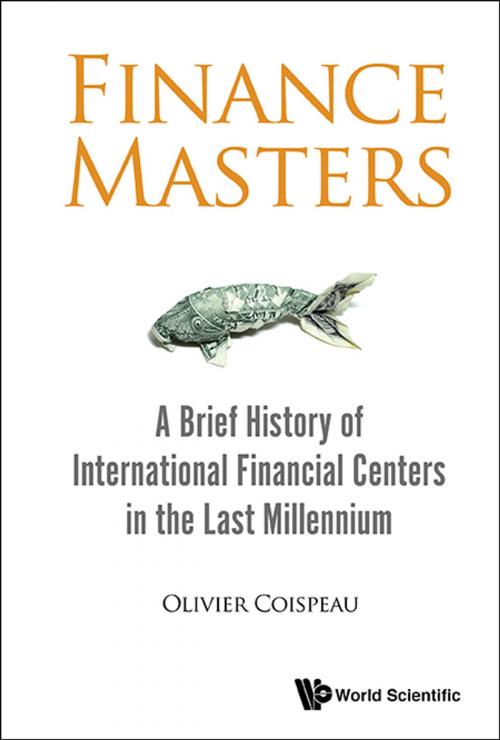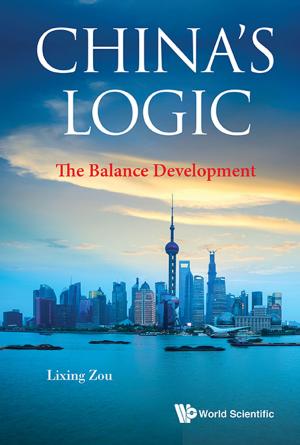Finance Masters
A Brief History of International Financial Centers in the Last Millennium
Business & Finance, Economics, International Economics, Economic History| Author: | Olivier Coispeau | ISBN: | 9789813108844 |
| Publisher: | World Scientific Publishing Company | Publication: | August 10, 2016 |
| Imprint: | WSPC | Language: | English |
| Author: | Olivier Coispeau |
| ISBN: | 9789813108844 |
| Publisher: | World Scientific Publishing Company |
| Publication: | August 10, 2016 |
| Imprint: | WSPC |
| Language: | English |
One thousand years ago, a handful of dynamic medieval city states developed trade at the frontier of capitalism. Their unique commercial ambition led to the emergence of finance capitals of international significance: Finance Masters. From the 11th century onward, international financial hubs, led by astute and bold merchant bankers and visionary leaders, inspired the numerous innovations that triggered economic revolutions in the last millennium and laid the ground for modern finance. This book explores not only classic financial centers, but also offshore financial centers and gambling centers to connect them to contemporary finance, and it also delves into the unique function of leading financial hubs to execute financial transactions over a wide geographical domain and transform the world economy.
The 2008–2009 Great Recession showed that working on fundamental issues such as market structure, pricing mechanism, and games was indeed necessary but probably still insufficient to create the antibodies needed to mitigate systemic risk and prevent the irrational exuberance capable of triggering devastating economic crash. In the continuation of the Theory of Moral Sentiments written by Adam Smith in 1759, seventeen years before his Wealth of Nations, it seems a deeper historical understanding of the key success factors which quietly assembled in the backyard of our market economy can be a useful lifeline. This book aims to explain the widening gulf that emerged over time between economics, regulatory and ethical considerations necessary to a smoother functioning of markets.
Finance Masters is also a book about the extraordinary men who led the evolution of modern finance with the innovations that changed the course of economic history. This book tries to capture the salient factors behind the geography of finance hubs from the early fairs in medieval England and Venice to Wall Street in contemporary New York. The development and the legacy of those "Finance Masters" deserve more attention to reflect upon the evolution of incumbent players and better understand their possible future. This book a must read for economics and finance students and young finance professionals, who seek a broader and better understanding of the origins of modern economics.
One thousand years ago, a handful of dynamic medieval city states developed trade at the frontier of capitalism. Their unique commercial ambition led to the emergence of finance capitals of international significance: Finance Masters. From the 11th century onward, international financial hubs, led by astute and bold merchant bankers and visionary leaders, inspired the numerous innovations that triggered economic revolutions in the last millennium and laid the ground for modern finance. This book explores not only classic financial centers, but also offshore financial centers and gambling centers to connect them to contemporary finance, and it also delves into the unique function of leading financial hubs to execute financial transactions over a wide geographical domain and transform the world economy.
The 2008–2009 Great Recession showed that working on fundamental issues such as market structure, pricing mechanism, and games was indeed necessary but probably still insufficient to create the antibodies needed to mitigate systemic risk and prevent the irrational exuberance capable of triggering devastating economic crash. In the continuation of the Theory of Moral Sentiments written by Adam Smith in 1759, seventeen years before his Wealth of Nations, it seems a deeper historical understanding of the key success factors which quietly assembled in the backyard of our market economy can be a useful lifeline. This book aims to explain the widening gulf that emerged over time between economics, regulatory and ethical considerations necessary to a smoother functioning of markets.
Finance Masters is also a book about the extraordinary men who led the evolution of modern finance with the innovations that changed the course of economic history. This book tries to capture the salient factors behind the geography of finance hubs from the early fairs in medieval England and Venice to Wall Street in contemporary New York. The development and the legacy of those "Finance Masters" deserve more attention to reflect upon the evolution of incumbent players and better understand their possible future. This book a must read for economics and finance students and young finance professionals, who seek a broader and better understanding of the origins of modern economics.















